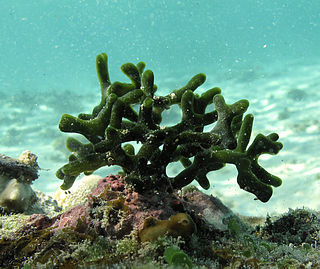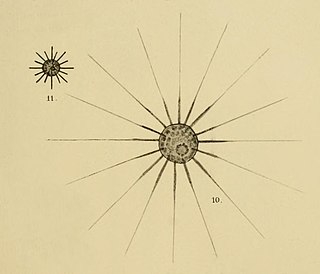
The glaucophytes, also known as glaucocystophytes or glaucocystids, are a small group of freshwater unicellular algae, less common today than they were during the Proterozoic. Only 15 species have been described, but more species are likely to exist. Together with the red algae (Rhodophyta) and the green algae plus land plants, they form the Archaeplastida. However, the relationships among the red algae, green algae and glaucophytes are unclear, in large part due to limited study of the glaucophytes.
Lambia is a genus of green algae in the family Bryopsidaceae.

Codium is a genus of seaweed in the Chlorophyta of the order Bryopsidales. Paul Silva was an expert on the genus Codium taxonomy at the University of California at Berkeley. There are about 50 species worldwide.

AlgaeBase is a global species database of information on all groups of algae, as well as one group of flowering plants, the sea-grasses.

Eustigmatophytes are a small group of eukaryotic algae that includes marine, freshwater and soil-living species.

The Trebouxiophyceae are a class of green algae, in the division Chlorophyta. Their circumscription within the green algae is not well established due to the need for more genetic studies at higher levels within the group.

Bryopsidales is an order of green algae, in the class Ulvophyceae.

Chaetophoraceae is a family of green algae in the order Chaetophorales.

Botryococcus is a genus of green algae. The cells form an irregularly shaped aggregate. Thin filaments connect the cells. The cell body is ovoid, 6 to 10 μm long, and 3 to 6 μm wide. Fossils of the genus are known since Precambrian times, and form the single largest biological contributor to crude oil, and are a major component of oil shales.
Bryopsidella is a genus of green algae in the family Bryopsidaceae.
Neochloris is a genus of green algae in the family Neochloridaceae.
Heterococcus is a genus of yellow-green algae in the family Heteropediaceae.
Trichosarcina is a genus of green algae in the order Ulotrichales. Filoprotococcus was once regarded as a synonym. However, Filoprotococcus is now considered valid in its own right. Trichosarcina is considered to be of uncertain validity.
Arabicodium is a genus of green algae in the family Codiaceae.
Rhexinema is a genus of green algae in the order Ulotrichales. Recent research has suggested that the genus Helicodictyon is a synonym of Rhexinema.
Chlorotetraedron is a genus of green algae, in the family Neochloridaceae. The name may also be written as Chlorotetraëdon.

Acanthosphaera is a genus of green algae, in the family Chlorellaceae.
Acicularia is a genus of green algae in the family Dasycladaceae.
Filoprotococcus is a genus of green algae in the order Ulotrichales. It was once regarded as a synonym of Trichosarcina. However, it is now accepted as a genus in its own right, and Trichosarcina is considered taxonomically uncertain.
Tribonema is a genus of filamentous, freshwater yellow-green algae. The holotype for the genus is the species Tribonema bombycina (C.Agardh) Derbès & Solier.








